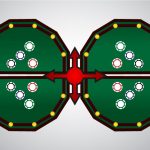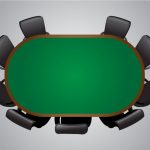Disclaimer: This guide is based on my experiences of $10 DON SNGs.
Introduction
This post follows on from my Introduction to DONs and looks at post-flop play and how play needs to adjust as a tournament progresses.
Post-Flop Play
When you see a flop, you really need to have something to continue. I don’t hate c-betting but it has less value than in normal tournaments (this goes for other bluffs too) and therefore I don’t often c-bet. If I choose to c-bet it will have to be on a dry board against a tight opp and with a hand that still has some value (e.g. overcards) and not just any two. My default play when I’ve missed is usually to check.
When you do have a hand (and by this I mean at least top pair), play it fast unless it’s a genuine monster. As with c-bet/bluffing, slowplaying has little value. A made hand is one of our few opportunities to build our stack, so bet it hard and don’t complain if everyone folds.
If you have a made hand on the flop and we face resistance then folding is once again your default play*. I want at least trips to carry on here and have routinely folded two pair many times in the past. Your opponents are playing much tighter and are also generally leaning towards a fold in most instances. If they play back at you on the flop then they’re hardly ever doing this with a bluff or even with TPTK. I’d suggest that these instances are so few that you’re not missing a great deal of value by folding when they do unknowingly occur.
*The ability to fold when facing resistance (unless you have a very strong hand and/or killer read) is a key skill in DONs and is something that will give you an edge over your opponents. As I stated in my introduction to DONs, the inability to fold seemingly strong hands such as AA is the number 2 mistake I see from players of DONs.
Hands don’t often get to the turn or river and if they do, it’s either being checked down or someone has a monster. If you go beyond the flop be incredibly careful unless you’re holding the nuts. Unless my hand is super strong, my default play would be to try and check the hand down unless I felt a there was a high percentage chance that I was ahead. The same obviously applies to scary boards.
Widening Your Range
It is optimal to remain tight throughout a DON but, as with other SNGs, it is a good idea to widen your range slightly as the tournament progresses. Typically, I do this when the antes kick-in and increase and when the field is reduced to 7 players. Conversely, my play tightens up again when the tournament reaches the bubble.
When I widen my range this is focussed on late position. Small to medium pairs still have little value in the early positions at the table. Infact, small pairs remain largely useless throughout a DON tournament.
Stealing Blinds
It might seem obvious that you’re going to be stealing blinds a lot less often but there’s still a place for it under the right circumstances. Bear in mind that most of your opponents are inclined to fold more than usual so the situation is often ripe for blind stealing from the button and CO providing those still to act are not idiots and you have a reasonable hand. Stealing in the early rounds is largely pointless but as the tournament progresses, it can be useful (and often crucial, particularly on the bubble) in maintaining your stack.
M
It is typical of normal SNGs that you should be looking to get all-in with an M of 5 or less. In DONs however, because of the tighter play that happens as a result of the flat payout structure, this can be stretched. Typically, I don’t reach panic stations until my M is less than 3. Depending on the other stack sizes at the table, this could be stretched to 2 or even less if the bubble has been reached.
If I have a hand that I want to raise, I will be going all-in if the raise is enough to take my M significantly below 3 and/or if the blinds are about to hit and will affect my stack significantly.
When looking at your M at the M of others at the table, try and be aware of when the blinds are going up as this will obviously affect your raising / all-in decisions.
When your M becomes short and you are looking to raise/shove try and be aware of the position of the short and big stacks at the table. The shorter you get then the more likely the big stacks will call but the small stacks may also call if they are desperate. Meanwhile, the average stacks are just looking to fold and avoid trouble. The same thinking can be applied to stealing blinds.
Submit your review | |






